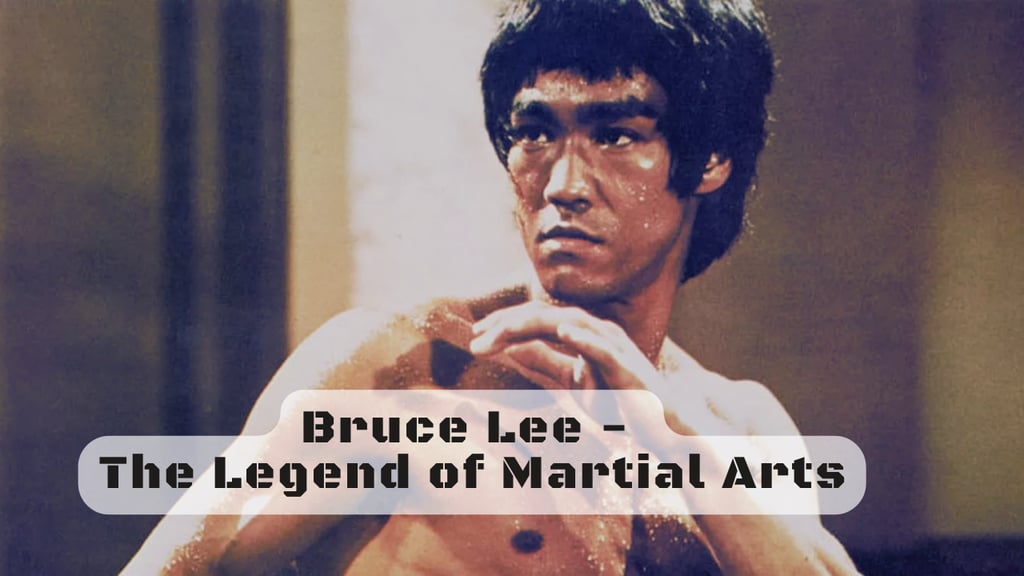Bruce Lee - The Legend of Martial Arts


Early Life and Background
Bruce Lee, born Lee Jun-fan on November 27, 1940, in San Francisco, California, was a man of extraordinary talent whose influence on martial arts and popular culture remains unparalleled. His father, Lee Hoi-chuen, was a prominent Cantonese opera star, and his mother, Grace Ho, came from a wealthy and influential family. This blend of artistic and affluent backgrounds provided Bruce with a unique cultural environment that would shape his future endeavours.
Shortly after his birth, Bruce Lee's family relocated back to Hong Kong, where he spent his formative years. The bustling city, rich in tradition and teeming with diverse influences, played a significant role in moulding his character. Growing up in post-war Hong Kong, Bruce was exposed to both the vibrancy and the challenges of urban life. This setting ignited his interest in martial arts as a means of self-defence and personal development.
From a young age, Bruce exhibited a keen interest in physical fitness and martial arts. His initial foray into the martial arts world began with training in Wing Chun under the tutelage of the legendary Ip Man. This foundational training not only honed his skills but also instilled in him a deep respect for the discipline and philosophy of martial arts. Despite occasional bouts of trouble during his teenage years, Bruce's determination to excel in martial arts never wavered.
Bruce Lee's early education was marked by a blend of traditional and modern influences. He attended La Salle College and later St. Francis Xavier's College in Hong Kong, where he balanced academic pursuits with his burgeoning passion for martial arts. Several key moments during this period, including street fights and challenges from other martial artists, solidified his resolve to pursue martial arts seriously. These experiences not only tested his abilities but also fueled his ambition to innovate and transcend conventional boundaries in martial arts.
This intricate tapestry of cultural heritage, familial influence, and personal experiences laid the foundation for Bruce Lee's legendary journey in the world of martial arts. His early life was a crucible in which his indomitable spirit and revolutionary vision were forged, setting the stage for his future accomplishments and enduring legacy.
Rise to Stardom
Bruce Lee's journey to becoming a global superstar is a testament to his perseverance and unwavering dedication to his craft. Born in San Francisco but raised in Hong Kong, Lee's path to stardom began when he moved to the United States in 1959. Seeking both educational and professional opportunities, he enrolled at the University of Washington in Seattle, where he majored in philosophy. During this period, Lee also started teaching martial arts, which soon became a significant part of his life.
Despite his talent and charisma, Bruce Lee initially faced numerous challenges in gaining recognition within the American entertainment industry. Roles for Asian actors were limited and often stereotypical, making it difficult for him to showcase his full range of abilities. However, Lee's relentless spirit and innovative approach to martial arts caught the attention of producers, landing him his first significant role in the television series 'The Green Hornet' in 1966. Portraying Kato, the martial arts expert and sidekick to the titular character, Lee's dynamic performance left a lasting impression on audiences, although the show was short-lived.
The real turning point in Bruce Lee's career came when he returned to Hong Kong, where his reputation had grown due to his television appearances in the United States. Lee starred in several box office hits, including 'The Big Boss' and 'Fist of Fury,' which showcased his martial arts prowess and charismatic screen presence. His breakthrough role came with 'Enter the Dragon' in 1973, a film that remains one of the most influential martial arts movies of all time. 'Enter the Dragon' not only cemented Lee's status as a global icon but also brought martial arts cinema to the forefront of popular culture.
Through his unparalleled skill and relentless ambition, Bruce Lee rose to stardom, leaving an indelible mark on the world of martial arts and entertainment. His journey from a struggling actor to a legendary figure is a powerful narrative of determination and talent, inspiring countless individuals across generations.
Jeet Kune Do: A New Era in Martial Arts
Bruce Lee's development of Jeet Kune Do marked a transformative moment in the world of martial arts. Unlike traditional styles that rigidly adhered to specific forms and techniques, Jeet Kune Do, or "The Way of the Intercepting Fist," emphasized adaptability and efficiency. Lee's philosophy was based on the idea that martial arts should not be confined to preset patterns, but should instead be fluid, evolving with the practitioner's experiences and needs.
One of the core principles of Jeet Kune Do is its focus on directness and simplicity. Lee believed that the most effective techniques are those that are straightforward and unencumbered by unnecessary movements. This approach was revolutionary at the time, as it challenged the established norms that prioritized elaborate forms and sequences. By stripping away the superfluous, Lee's method allowed for quicker, more effective responses in combat situations.
Adaptability is another fundamental aspect of Jeet Kune Do. Lee encouraged martial artists to be like water, capable of flowing and adapting to any situation. This principle of flexibility meant that practitioners were not limited to a single style or tradition but were encouraged to integrate various techniques from different martial arts. This eclectic approach enabled them to respond more effectively to the diverse challenges they might face.
Self-expression is also a key tenet of Jeet Kune Do. Bruce Lee believed that martial arts should be a form of personal expression, reflecting the individual's unique characteristics and abilities. This philosophy empowered martial artists to develop their own styles, tailored to their strengths and preferences, rather than conforming to a rigid, one-size-fits-all system.
Lee's innovative approach fundamentally changed the landscape of martial arts. By challenging the traditional practices, he opened the door for future generations to explore and innovate. His influence can be seen in the diverse and dynamic nature of modern martial arts, where adaptability, efficiency, and personal expression are celebrated as essential elements of a martial artist's journey.
Philosophy and Self-Expression
Bruce Lee's philosophy was deeply ingrained in his martial arts practice, forming a holistic approach that emphasized the unity of mind and body. Central to his beliefs was the concept of self-actualization, the idea that one must strive to realize their full potential. Lee often spoke about the importance of understanding oneself, stating, "Knowing is not enough; we must apply. Willing is not enough; we must do." This encapsulates his emphasis on action and application as pathways to true understanding and growth.
One of Lee's most famous philosophical tenets is to "be like water." He urged people to be adaptable and fluid, able to respond to any situation with ease and flexibility. "Empty your mind, be formless, shapeless, like water. If you put water into a cup, it becomes the cup. You put water into a bottle, it becomes the bottle. You put it in a teapot, it becomes the teapot. Now, water can flow or it can crash. Be water, my friend," Lee famously said. This metaphor extends beyond martial arts, encouraging individuals to embrace change and remain resilient in the face of adversity.
Lee's views on the mind-body connection were revolutionary. He believed that martial arts were not just about physical prowess but also mental discipline. "
Breaking Stereotypes in Hollywood
Bruce Lee's arrival in Hollywood heralded a transformative era in the film industry, challenging and reshaping entrenched racial and cultural stereotypes. In the 1960s and early 1970s, Hollywood was dominated by Western ideals, often relegating Asian characters to the periphery or portraying them through derogatory and simplistic stereotypes. Bruce Lee faced significant challenges in this environment, including being typecast and marginalized. However, his unwavering determination and exceptional talent enabled him to transcend these barriers.
Lee's impact on Hollywood was multifaceted. Not only did he bring martial arts to the forefront of cinematic action, but he also insisted on portraying Asian characters with dignity, depth, and complexity. Unlike the caricatured roles that were prevalent at the time, Lee's characters were strong, intelligent, and multifaceted. His films, such as "Enter the Dragon" and "The Way of the Dragon," showcased his martial arts prowess while also providing a platform for a more nuanced representation of Asian culture.
In addition to his on-screen achievements, Bruce Lee's off-screen efforts were equally significant. He was a vocal advocate for breaking down racial barriers and promoting cultural understanding. His success in Hollywood opened doors for future Asian actors and filmmakers, setting a precedent for more diverse and authentic portrayals of Asian characters in mainstream cinema. Lee's legacy in Hollywood is a testament to his vision and perseverance, proving that talent and authenticity can transcend racial and cultural boundaries.
Bruce Lee's influence extends beyond the realm of martial arts and film. He is remembered as a trailblazer who challenged the status quo and paved the way for greater representation and inclusivity in Hollywood. His efforts to break stereotypes and elevate the portrayal of Asian characters have left an indelible mark on the industry, inspiring generations of actors and filmmakers to continue his mission for a more diverse and equitable cinematic landscape.
Legacy and Lasting Impact
Bruce Lee's legacy extends far beyond his lifetime, leaving an indelible mark on martial arts, film, and popular culture. His revolutionary approach to martial arts, which combined elements from various disciplines into his own system called Jeet Kune Do, transformed the way martial arts were practised and perceived. Lee's philosophy emphasized practicality, efficiency, and personal expression, influencing countless martial artists around the world. Today, Jeet Kune Do remains a respected and practised martial art, with schools dedicated to teaching Lee's methods and principles.
In the realm of cinema, Bruce Lee redefined the martial arts genre. His dynamic presence, unparalleled skill, and charismatic performances brought martial arts films to the global stage. Movies like "Enter the Dragon" and "The Way of the Dragon" not only showcased his extraordinary talent but also laid the groundwork for future action films. Lee's influence can be seen in the careers of actors and martial artists such as Jackie Chan, Jet Li, and Donnie Yen, who have all cited him as a major inspiration.
Popular culture continues to celebrate Bruce Lee through various tributes and homages. From video games and comic books to music and fashion, his image and philosophy are perpetuated in diverse forms of media. Statues, murals, and documentaries commemorate his life and achievements, ensuring that new generations are introduced to his legacy. Lee's iconic yellow jumpsuit, his philosophical writings, and his distinctive martial arts techniques remain instantly recognizable symbols of his enduring impact.
Moreover, Bruce Lee's teachings and philosophy resonate deeply with people beyond the martial arts community. His emphasis on self-improvement, adaptability, and breaking free from limitations continues to inspire individuals in various fields. Lee's famous aphorism, "Be water, my friend," encapsulates his approach to life and martial arts, advocating for flexibility and resilience. This timeless wisdom is as relevant today as it was during his lifetime, reflecting the universal nature of his contributions.
